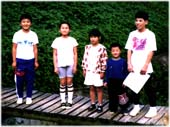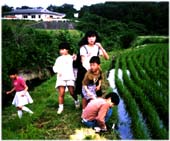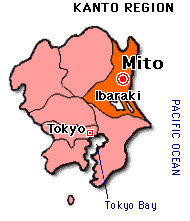Learning About Nature Close By
--Mito Kids' Eco Club--
 The Mito Kids' Eco Club was formed in 1995. Right now, it has 30 members, aged 6 to 12, who attend schools in Mito, the capital of Ibaraki Prefecture.
The Mito Kids' Eco Club was formed in 1995. Right now, it has 30 members, aged 6 to 12, who attend schools in Mito, the capital of Ibaraki Prefecture.
Almost every month, members gather to engage in ecology-related activities, such as recycling and inspecting the water quality of local rivers and lakes. They also visit nearby forests, hills, and countryside nearly every week, led by the club's two volunteer supporters.
Because the city of Mito is located just 10 kilometers (6 miles) from the Pacific Ocean, members have become quite familiar with the ecosystems of beaches. They've also learned a lot about the wildlife around rivers, lakes, and ponds.
Thinking about swans
In February last year, the children visited nearby Otsuka Pond to observe swans. According to club supporter Masao Oyama, almost a hundred swans fly to the pond from Siberia every year to spend the winter months there.
At the pond, they turned their thoughts to the swans' long journey from Siberia and collected litter around it. Among the trash they collected were fishing lines and plastic bags, which could injure the birds.
"I learned that we shouldn't feed the swans greasy snacks but that we should give them bread," one member said.
 In June last year, they checked the quality of water at the lake Hinuma, about 10 kilometers (6 miles) outside Mito. "We saw how clean the water is and what type of animals live there and compiled what we found into a report. We presented this at a local ecology film festival," another member said.
In June last year, they checked the quality of water at the lake Hinuma, about 10 kilometers (6 miles) outside Mito. "We saw how clean the water is and what type of animals live there and compiled what we found into a report. We presented this at a local ecology film festival," another member said.
Excess packaging
In January this year, the kids visited a number of supermarkets and convenience stores to ask what kind of recycling activities they engaged in. Each member also bought 500 yen worth of snacks and candies to see how much of it wound up being thrown away.
"It surprised me that these products could produce so much garbage. A lot of packaging is probably unnecessary," one member said.
Club members are planning to continue inspecting the natural environment and ecosystems of the neighboring hills and forests during the rest of the year.
Photos: (Top) Members of the Mito Kids' Eco Club; (above) Club members check the quality of water in a rice paddy. (Masao Oyama)



 The Mito Kids' Eco Club was formed in 1995. Right now, it has 30 members, aged 6 to 12, who attend schools in Mito, the capital of Ibaraki Prefecture.
The Mito Kids' Eco Club was formed in 1995. Right now, it has 30 members, aged 6 to 12, who attend schools in Mito, the capital of Ibaraki Prefecture.
 In June last year, they checked the quality of water at the lake Hinuma, about 10 kilometers (6 miles) outside Mito. "We saw how clean the water is and what type of animals live there and compiled what we found into a report. We presented this at a local ecology film festival," another member said.
In June last year, they checked the quality of water at the lake Hinuma, about 10 kilometers (6 miles) outside Mito. "We saw how clean the water is and what type of animals live there and compiled what we found into a report. We presented this at a local ecology film festival," another member said.
![]()